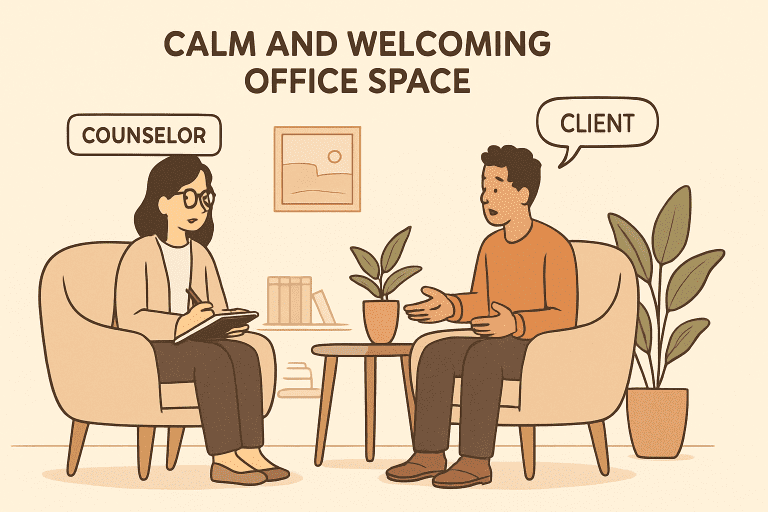Why Counseling Matters: Its Significance in Today’s Society

The Importance of Counseling
Table of Contents
- Introduction
- Addressing the Mental Health Crisis
- Enhancing Emotional Resilience
- Improving Relationships and Communication
- Reducing Stigma Around Mental Health
- Conclusion
Introduction
In today’s fast-paced and demanding world, mental health challenges are increasingly coming to the forefront of societal concern. The pressures of modern life, ranging from work-related stress, complex family dynamics, economic instability, and growing societal expectations, contribute to a noticeable rise in mental health struggles across all age groups. Stress can stem from a multitude of sources: balancing work and personal life, navigating relationships, coping with financial uncertainty, adapting to rapid technological change, and responding to the constant influx of global issues. Amid these challenges, professional counseling has become a critical lifeline. Services like counseling West Bloomfield offer a safe and supportive environment where individuals can process their feelings, gain insight, and receive expert guidance tailored to their unique circumstances.
The importance of counseling isn’t just in addressing crises—it is also about fostering lasting general well-being and empowering people with the tools and understanding needed to navigate everyday life skillfully. Counseling provides a structured, confidential space where individuals can speak freely, explore their inner worlds, and receive the kind of support that encourages growth. With more people acknowledging their mental health needs, thanks in part to reduced stigma, access to high-quality, compassionate support has never been more vital in cultivating healthy individuals and resilient communities.
Addressing the Mental Health Crisis
Mental health disorders such as anxiety, depression, and trauma-related issues are now recognized as widespread concerns impacting individuals and communities globally. According to the World Health Organization, approximately one in eight people worldwide live with a mental disorder, underscoring just how prevalent these challenges have become. Untreated, these conditions can take a serious toll not only on the individual—disrupting work life, damaging relationships, and even leading to physical health problems—but also on broader society through lost productivity and increased healthcare costs.
Counseling offers a crucial intervention point—providing an environment where people feel genuinely heard and understood, and where they can develop personalized strategies for symptom management, building resilience, and recovery. Counselors are trained to identify early signs of distress, intervene before problems escalate, and support clients in setting achievable goals for their mental and emotional health. Importantly, professional counseling is not limited to crisis management. Many people turn to therapy for ongoing personal development, to navigate relationship or career transitions, or to maintain their mental well-being over the long term. Regular sessions with a trained counselor can enhance self-confidence, help manage emotional challenges, and empower individuals to lead more productive and fulfilling lives, even in the face of adversity or change.
Enhancing Emotional Resilience
Emotional resilience—the ability to recover from setbacks, adapt to change, and keep moving forward in the face of adversity—is an essential skill for thriving in today’s unpredictable world. Counseling is foundational in helping clients better understand and regulate their emotions, so they are less easily overwhelmed by challenges or negative thinking patterns. By working alongside counselors to examine recurring patterns of self-doubt, worry, or avoidance, individuals gradually learn to question unhelpful beliefs and adopt healthier, more adaptive ways of thinking and coping. This self-awareness is the cornerstone of resilience.
Therapists often employ evidence-based approaches, such as cognitive-behavioral therapy (CBT), mindfulness practices, and solution-focused strategies, to equip clients with practical tools they can use in everyday life. Through regular practice of these techniques, individuals develop the skills to manage stress, cope with disappointment, and maintain equilibrium even in the face of life’s inevitable challenges. Over time, these skills not only alleviate distress and prevent future episodes of mental health crisis but also contribute to greater emotional stability and overall life satisfaction. Research from the American Psychological Association shows that resilience training and counseling can significantly reduce the long-term psychological effects of stress and trauma, leading to healthier, more engaged lives.

Improving Relationships and Communication
Healthy relationships are fundamental to human happiness and overall well-being, acting as both a buffer against stress and a source of meaning in life. Nonetheless, poor communication, unresolved conflicts, and misunderstandings can strain even the closest bonds, often leading to cycles of frustration and hurt that are difficult to break without external support. The importance of counseling is imperative here as it offers a confidential and impartial setting where individuals, couples, or families can openly explore their communication patterns, discuss challenging topics, and learn new, constructive ways to connect.
Through guided sessions, therapists teach practical techniques such as active listening, empathy, boundary setting, and assertiveness. These skills help clients identify their own needs and feelings, while also gaining a deeper understanding of those of others. As a result, therapy can be transformative—resolving existing conflicts and preventing new ones. Family or couples counseling sessions often lead not only to resolving current problems but also to improving future communication by modeling healthy ways to navigate disagreements and foster compromise. As people grow more attuned to their own inner experiences and those of others, deeper and more satisfying connections are forged. This has lasting positive effects at home, in workplaces, and within the broader community.
Reducing Stigma Around Mental Health
While public awareness about mental health is increasing, persistent stigma and social misunderstanding continue to act as barriers to care. Too often, individuals hesitate to seek support because they fear being judged, labeled, or misunderstood by friends, family, or colleagues. Counseling breaks this cycle by providing a confidential, nonjudgmental setting where everyone’s experiences are respected and validated. Through compassionate listening and validation, counselors model acceptance, empathy, and understanding—qualities that clients often internalize and carry with them into their personal and professional communities.
As more people share their mental health journeys and positive experiences with counseling, misconceptions begin to break down and the broader culture shifts toward empathy and inclusivity. The normalization of professional counseling helps ensure that larger segments of the population are willing to access the support they need. In turn, this leads to healthier families, more productive workplaces, and communities where people look out for each other and prioritize both mental and physical well-being.
The Importance of Counseling
The importance of counseling can’t be denied as it is an indispensable resource in modern society, offering tools to address immediate challenges as well as opportunities for long-term personal growth. By combating stigma, supporting emotional resilience, strengthening communication, and encouraging self-discovery, counseling enables individuals to thrive even during life’s storms. As society increasingly values mental wellness alongside physical health, accessible, expert-guided counseling will remain essential for fostering healthier, happier, and more fulfilled communities for generations to come.

